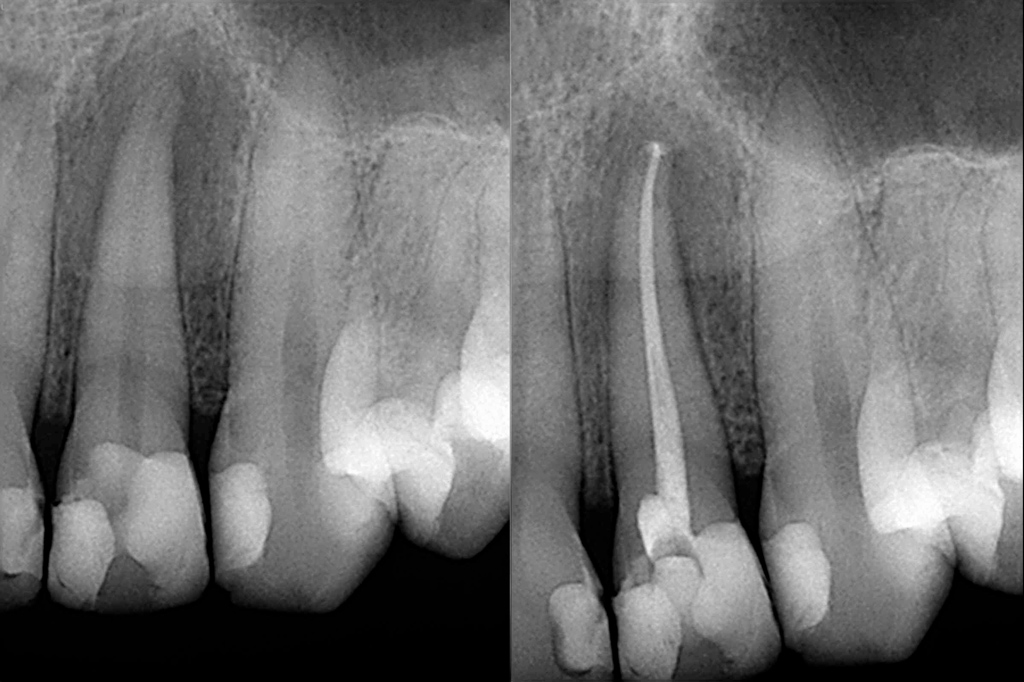
Root Canal Therapy
Occasionally, a tooth may be damaged so extensively that a dental filling may not be enough to fix the problem. In these instances, additional treatment targeting the nerves of a tooth is required. This is called a root canal treatment.
Common signs and symptoms of a tooth that requires root canal treatment include:
- Pain – described as extreme sensitivity or soreness which lingers. This can be spontaneous or triggered by hot/cold or biting.
- Abnormal pain presentations – such as pain which is only relieved by cold water in the mouth or pain which worsens when you are lying down.
- Abscess – seen as a pimple on the gums beside the affected tooth, swelling in the mouth or in the general facial area, and possibly, a foul taste coming from it.
- Very large holes / broken teeth – Generally if a tooth is very broken down, the likelihood the nerve is exposed is high.
- Discolouration – If a tooth is discolored compared to your other teeth, the nerve central to the tooth may no longer be alive, even without symptoms of pain.
We understand the stress and frustration that a tooth can cause so we will always do our best to accommodate you as soon as possible. Our various clinics are open 6 days a week with early morning and late nights to suit your busy lifestyle
FAQs
I’ve been told I need a root canal but it doesn’t hurt that bad. Can I wait on it?
While you can wait awhile, it is generally recommended to start as early as possible once your dentist recommends the process. This is because as soon as or after the nerve of the tooth dies, an infection may start to develop around the tooth itself.
Various studies have shown that root canal treatment has a much higher chance of success if it is carried out before an infection has started or is widespread. This is because bacteria can sometimes hide in nooks and crannies in the bone or within the tooth itself causing problems in the future.
Does root canal treatment hurt?
During the treatment itself, sufficient anesthetic is applied to numb up the area to remove pain and discomfort. Note: It is very important to let your dentist know if there is still any pain sensations or discomfort throughout the process so they can manage it accordingly.
In between root canal appointments, there may be some discomfort with the tooth for a couple of days. This is typically managed with standard pain management (as discussed with your dentist). The ultimate goal of a root canal treatment is to reach a stage where the tooth is absolutely symptom free before the process is completed.
My dentist recommended a crown for my tooth after a root canal treatment. What’s up with that?
A common mistake people make with the root canal treatments not lasting long is that oftimes, the report that the tooth itself breaks months/years after the treatment is completed.
The problem is that while root canal treatment eliminates pain from the tooth itself, structurally, the tooth itself is weakened once the process is completed. This is because a lot of preparation is needed on the tooth for the treatment itself, and thus it is at risk of breaking in the future. Hence, crowns or similar cusp-coverage restorations are needed to help protect the tooth itself and hold everything together.
Why do I need to go to a specialist dentist (endodontist) sometimes?
Not all teeth are the same. Some have extra roots, some have curvy roots, others at times, have much more nerves than expected.
When a dentist examines your case and determines that you are likely to have a much higher chance of success if your treatment is done by a specialist, they will refer you on to them.
Does root canal treatment last forever?
Generally, when done well, root canal treatment is fairly successful and can be expected to have a long life. However, some teeth do have the potential for re-infections in the future depending on various factors such as how infected the tooth was initially and the difficulty of the root canal itself (curved or multiple roots). In these cases, your dentist may recommend you see a specialist to have the tooth treated with a higher level of expertise for a more successful result.
